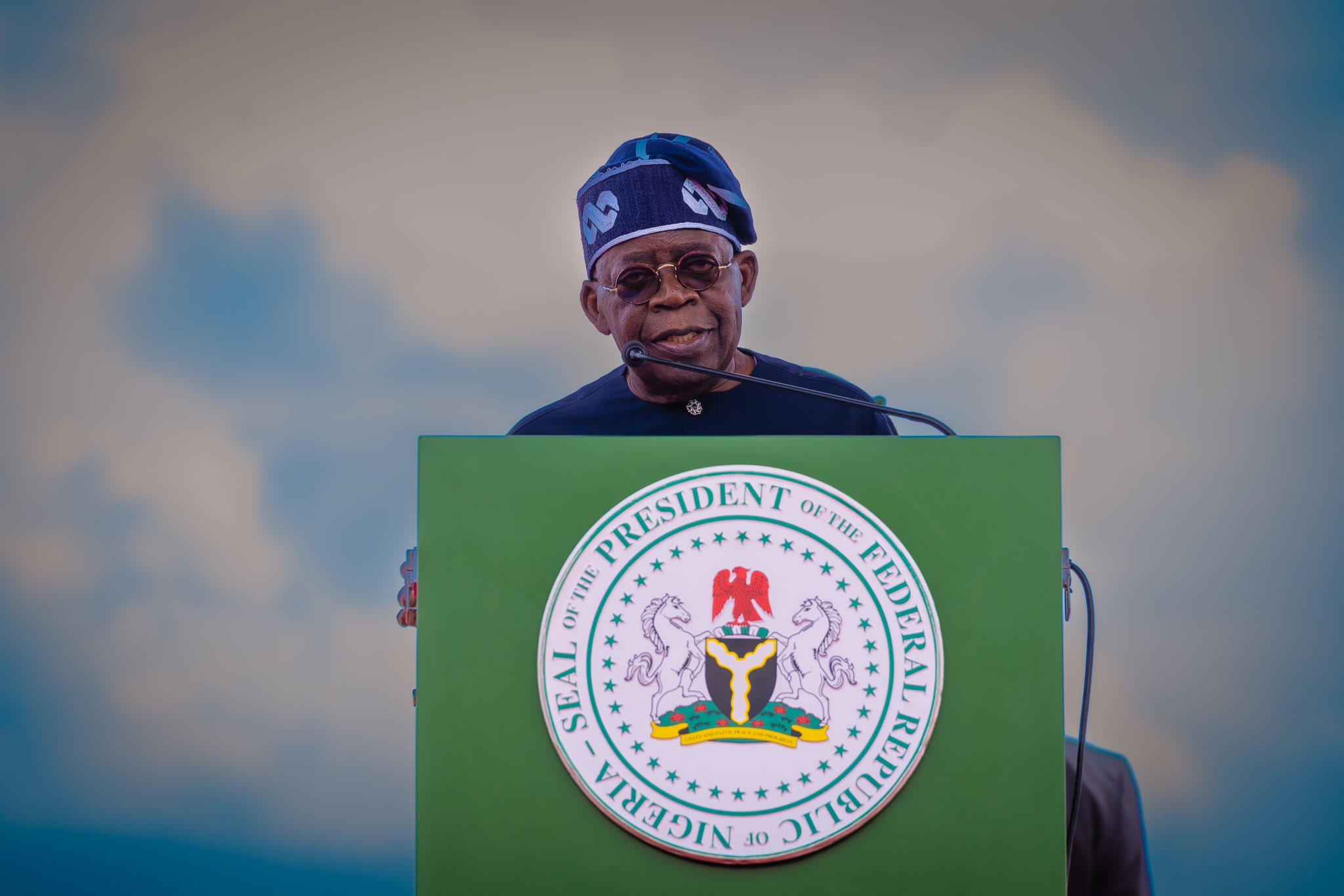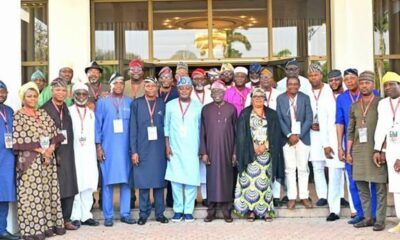The Nation
Tax Reform Bill: Negotiation as northern groups, others list conditions to cease fire

Amid mounting opposition from northern stakeholders to the proposed Tax Reform Bills in the National Assembly, prominent regional groups have outlined specific conditions for withdrawing their resistance.
These groups, including the Northern Elders Forum (NEF), Arewa Consultative Forum (ACF), and Arewa Youth Consultative Forum (AYCF), emphasized that their opposition is driven by concerns over the potential economic impact of the reforms on the North.
The groups demanded assurances of accountability, transparency, expanded consultations, and commitments to addressing historical inequalities that have contributed to the region’s underdevelopment. They argued that these measures are essential for building trust and fostering sustainable peace.
Negotiations
His words:”In my opinion, a ceasefire on the controversy surrounding President Tinubu’s tax reform bills is achievable, but only through a concerted effort towards genuine negotiation.
“This necessitates inclusivity, transparency, accountability, and a commitment to addressing the underlying socio-economic challenges of Northern Nigeria.
“It requires walking a tightrope between the need for fiscal responsibility and the imperative of social justice.
“The path to resolution is fraught with complexities, requiring a nuanced understanding of the diverse perspectives at play and a commitment to dialogue. “A simple cessation of hostilities is insufficient; rather, a sustainable peace requires addressing the underlying grievances and building trust.
Poverty
“The core of the opposition stems from concerns regarding the potential impact of these reforms on the already strained economic conditions of Northern Nigeria.
“The region grapples with significant challenges – from poverty and unemployment to limited access to education and healthcare.
“Many fear that the proposed tax increases, without accompanying measures to alleviate these existing pressures, will disproportionately burden the most vulnerable populations, exacerbating existing inequalities and fueling social unrest. This fear is not unfounded.
“The lack of transparency in the initial presentation of the bills, coupled with the perceived absence of adequate consultation with regional stakeholders, has further inflamed these concerns.
“This has led to a perception that the reforms are being imposed rather than negotiated, feeding into existing anxieties about marginalization and unequal distribution of resources.
“The call for negotiation, therefore, is not merely a tactical manoeuvre but a fundamental requirement for restoring confidence and achieving a lasting ceasefire.
Inclusivity
“The first crucial condition for successful negotiation is genuine inclusivity.
“The dialogue must not be limited to a select group of elites but must actively involve representatives from all segments of Northern society – from farmers and traders to professionals and religious leaders.
“Their diverse perspectives and concerns must be actively sought and integrated into the process. “This demands a conscious effort to bridge the communication gap between the federal government and the Northern populace, ensuring that information is disseminated transparently and that concerns are addressed directly and honestly.
“Furthermore, any meaningful negotiation must be predicated on a commitment to transparency and accountability.
“The government must provide clear, detailed explanations of the rationale behind the proposed tax reforms, outlining how the revenue generated will be utilized to benefit the northern region specifically. “This includes outlining clear plans for the improved provision of public services like healthcare, education, and infrastructure.
“Simply stating that the reforms are necessary for national development is insufficient; a concrete plan demonstrating tangible benefits for the North is essential.
Inequality
“This transparency should also extend to the process of revenue allocation and expenditure, ensuring that the people see the direct benefits of their contributions.
“Equally important is the establishment of independent monitoring mechanisms to ensure accountability and transparency throughout the implementation process.
“An independent body, comprising representatives from both the government and civil society, could be tasked with overseeing the implementation of the reforms and reporting regularly on their impact on the Northern region.
“This will help build trust and alleviate fears of misuse or misappropriation of funds.
“Finally, a ceasefire requires a genuine commitment to addressing the historical inequalities that have contributed to the current crisis.
“The North has long faced systemic challenges that have hindered its economic development.
“These include limited access to credit, inadequate infrastructure, and a lack of investment in human capital.
“Addressing these structural issues is not merely desirable but essential for building a sustainable and equitable future for the region.
“The tax reforms, if properly integrated into a broader strategy of regional development, can play a positive role in this process.
“However, this requires a significant investment in capacity building, infrastructure development, and targeted social programs designed to alleviate poverty and create opportunities for economic advancement.”
Not carried along
Similarly, President of AYCF, Yerima Shettima, lamented that the region wasn’t carried along by its elected representatives during the formulation of the bills.
He, however, called for a more participatory approach that involves dialogue and addresses the specific concerns of the North before implementation.
His words:”The position of the AYCF, a significant demographic group in Northern Nigeria, on this complex issue, requires careful consideration of our socio-economic context and perceived impact of the bill on our communities.
“While a monolithic stance is unlikely, our concerns generally revolve around equity, fairness, and the potential for disproportionate burden on the Northern region.
“Our primary concern stems from the perception of inequitable distribution of resources and infrastructure development across the country.
“We believe that despite contributing significantly to the national GDP through agriculture and other sectors, the North historically receives less in return in terms of public services, infrastructure investment, and developmental projects. “Consequently, the introduction of new taxes, without addressing this existing imbalance, is viewed with skepticism.
“They believe that increased taxation without corresponding improvements in infrastructure – roads, schools, hospitals, would unfairly burden a population already struggling with poverty, unemployment, and limited access to essential services.
Economy
“Another key concern is the potential impact of the tax reforms on informal sectors which heavily dominate the Northern economy.
“A large portion of the Arewa youth population is employed in the informal sector – agriculture, small-scale businesses, and artisanal trades – which often operates outside the formal tax net.
“The implementation of the tax reforms bill, particularly if it extends tax obligations to the informal sector, could pose a significant challenge. “We fear that increased tax burdens could cripple these businesses, leading to job losses and further economic hardship.
“The lack of adequate education and awareness about tax regulations also exacerbates this concern. “Many young people in the informal sector lack the knowledge and resources to understand and comply with new tax laws, potentially leading to fines and penalties, further marginalizing them economically.
“Furthermore, our position is also influenced by the perceptions of governmental transparency and accountability.
“Mistrust in government institutions and concerns about the proper utilization of tax revenue are prevalent.
“We question whether the increased tax revenue generated will be effectively utilized for the benefit of all Nigerians, or if it will be mismanaged or disproportionately benefit certain regions.
Corruption
“Concerns about corruption and lack of accountability in government spending further fuel this skepticism and contribute to our reluctance to embrace the tax reforms without robust guarantees of transparency and equitable distribution of resources.
“The lack of visible development projects and infrastructure in the North, despite past tax contributions, strengthens our belief that increased taxation without guarantees of responsible governance is unproductive.
“The absence of robust engagement and consultation with the Arewa youth by Northern Senators during the formulation of the tax reforms bill is a point of considerable frustration.
“We feel our concerns and perspectives have been largely ignored in the decision-making process. This lack of inclusivity fuels our distrust and reinforces our opposition to the bill in its current form. We call for a more participatory approach that involves meaningful dialogue and addresses our specific concerns before implementation.”
Dialogue
Also speaking, National Publicity Secretary of ACF, Prof Tukur Muhammad Baba, said:” As an organisation, ACF is yet to say anything publicly on the tax reform issue.
“It’s already looking like the Federal Government has agreed for dialogue on critical or contentious aspects of the proposed bills.
“Already, the Attorney-General of the Federation is billed to appear before the Senate on the bills. If anything, it’s probably now that ACF should come out to urge all parties, for or against the bills, to negotiate on truth, honesty and sincerity of purpose for the good of the nation.”
Seaports
Meanwhile, Executive Chairman of Borno Internally Generated Revenue Service, BoIGRs, Professor Ibrahim Bello Alhaji, told Sunday Vanguard that there is desire by economically advantaged states to subjugate the less-privileged ones.
Alhaji said such a situation would not augur well for the country.
The professor of economics said, “To all that have devoted time to read and understand the analogy, they would have noticed the intense desire and ego by the economically advantaged states to subjugate the less privileged ones, a development that would not augur well for the country as a whole.
“As is common in all countries, endowments, socioeconomically and otherwise, differ between the different regions in Nigeria.
“The variation in endowments implies different growth prospects for the different states.
“The sea ports in Lagos for example, along with other socioeconomic antecedents, have made the South-West region a prominent industrial location.
“The vast crude oil deposit in the South-South has made the region vibrant in generating revenue for the country, while the northern part of the country is blessed with agricultural and solid mineral resources.
“In addition to the sea port in Lagos, the South-West region is advanced in terms of socioeconomic infrastructure and security and this make their economies relatively more stable.
“Those from the other regions particularly the North, are left to suffer all forms of social vices from massive infrastructural decay to pervasive unemployment, stinking poverty level and extreme insecurity.
“It is these unfavorable outcomes that necessitated the relocation of most of the few industrial outfits from other parts of Nigeria to Lagos and its surroundings, thereby improving the economic fortunes of all the states within that region.
“Nobody can deny these states the resultant windfall which comes to them in all forms.
Most favoured
“To this end, Lagos is the most favored state in Nigeria and, for a long time, it has been a major center of industrialization not only in Nigeria but also across the African continent.
“To vividly expose both the short and long run implications of the proposed VAT review policy, we would need the proponents to answer the following questions:
“Considering the so many socioeconomic problems of majority of the states in Nigeria today with attendant adverse consequences on the local populace, what informed the need for gradual upward review of VAT?
“What informed the decision to request for as high as 60% of the entire VAT proceeds at a time the South-West is in the forefront in revenue generation and is continuously receiving migrant businesses previously headquartered in other states?
“Assuming the proposal for review from 20% to 60% scales through as it is, would this not trigger further tremor for sharing and re-sharing vis-a-vis other treasures of the commonwealth?
“Have the proponents not envisaged that the proposed abrogation of multiple local taxes enshrined in the new policy can decapitate weaker states revenue wise?
“What compensatory arrangement is being proposed for the victimized states that would invariably suffer double-edged loss: having their hitherto 70% share reduced to 30%, and the abrogation of a large number of local taxes that previously constitute major source of revenue to them.
Equity Fund
“What evidence have the advocates to prove that a mere 5% equity fund proposed to be put in place would be enough to offset the above two adverse effects and other unforeseen defects on the economy of the weak states?
“Would this apparent segregationist growth policy not impact negatively on economic growth and further widen income inequality between states and among the citizenry?
“Apart from the perceived increment in revenue generation, which we fully know is not ‘an end in itself’, would higher VAT in a mono-cultured economy not erode purchasing power and slow down the pickup of cottage industry and economic diversification?
“Would the resultant dwindling revenue in majority of the states, following abrogation of local taxes, not cripple the need for infrastructure for industrialization and governance generally?
“Would the combine effects of the above not adversely affect employment opportunities, income generation, economic growth and, by extension, further depreciate the national currency? (Naira exchange rate).
“Would the policy not result to skewed and uneven development of the different regions?
Sacrifices
“Is it justifiable to copy advanced countries like Belgium, UK, France, Italy or even South Africa and Kenya being erroneously quoted by the proponents as our equals, in total disregard of the sacrifices and commitments they have made towards nation-building and their achievement over the past few decades?
“Surely, it is not just about skin colour and/or sheer ego, but about doing the right thing and getting it right from the beginning, persistently all through to the end.
“Why not cite example of countries within the same poor income status, the same infrastructural decay, the same demographic, cultural and political problems so that the antidote to be proposed would appropriately and directly address the identified constraints?
“For how long shall we continue to waste valuable time copying countries with whom we differ in so many respects instead of developing our own growth model?
“Are there no countries with only a negligible VAT% or even 0% VAT and yet fulfilling their socioeconomic goals, carrying all units, weak and strong to the promise land?
“Why are the tax practitioners and other relevant bureaucrats not included in the review committee?
“Why is the composition of the advisory committee not reflective of the country’s diversity so that from the on-set all opinions, arguments and counterarguments would have been resolved?
“As satisfactory answers to the above questions are most unlikely, I dare to say that to whichever side of the coin, it goes without contradiction that the Nigerian economy is sick, so sick that it is in a state of emergency.
“First, a proper diagnosis is required to know what exactly the cause of the sickness is. “The next step is to refer her (the country) to the appropriate specialist to professionally prescribe the antidote to the underlying cause.
“In conclusion, the country Nigeria belongs to all of us, and we must respect each others’ interest.”
Taraba, Kwara
Similarly, Corporate Affairs Manager of Kwara State Internal Revenue Service, Funmilayo Osagbemi, told Sunday Vanguard that the revenue service has not taken any position on the Tax Reforms Bills, saying the issue is still ongoing.
She said: “We are following up the debates and conversations about the Tax Reforms Bills. We are prepared. In concrete terms, we can’t take any position now until the debates are completed and we have real details before us. But we are ready for it.”
Also speaking, Chairman of Taraba State Board of Internal Revenue ,TBIR, Brig Gen Jeremiah Faransa ,retd, said the tax bills would significantly benefit the country.
He said: “I don’t want to comment much on it because it is before the National Assembly. However, I know the present administration means well, even if people are sceptical. Previously, we were running what could be described as a ‘dummy economy,’ but this government has been transparent about the state of things.
“For example, the bills propose relief for businesses with a turnover of ?50 million or less. Additionally, federal government will take only 10% of VAT, while states and local governments will share the remaining 90%. There will also be no taxes imposed on the common man.”
































